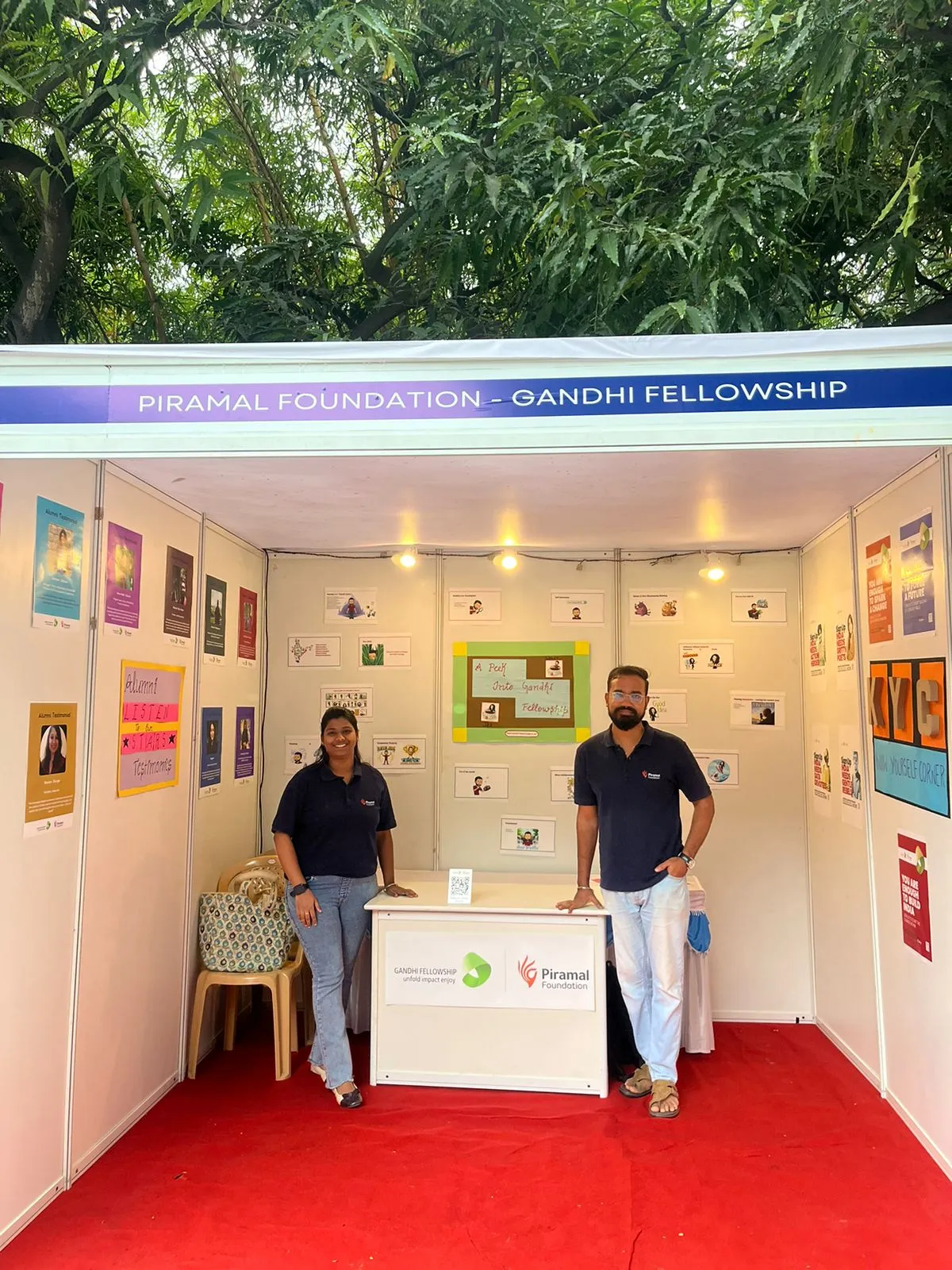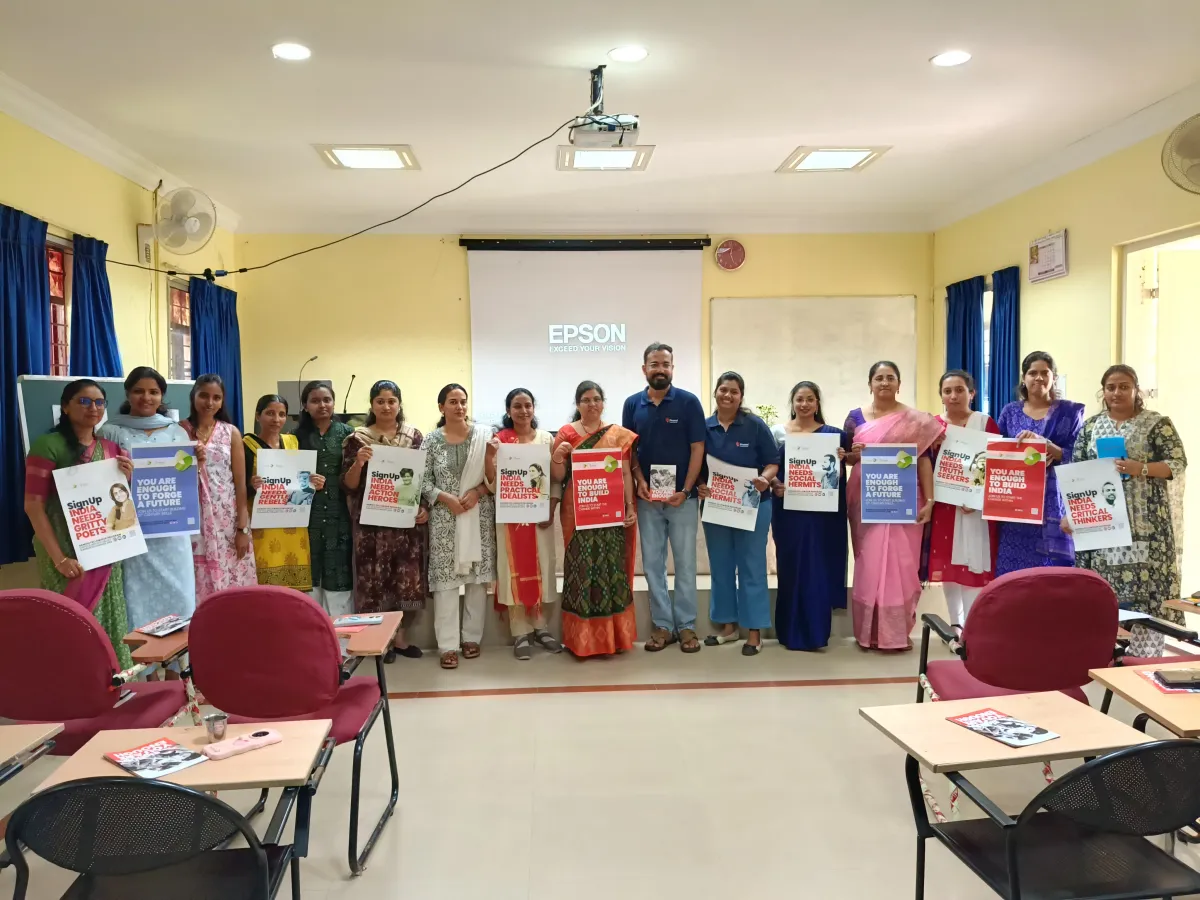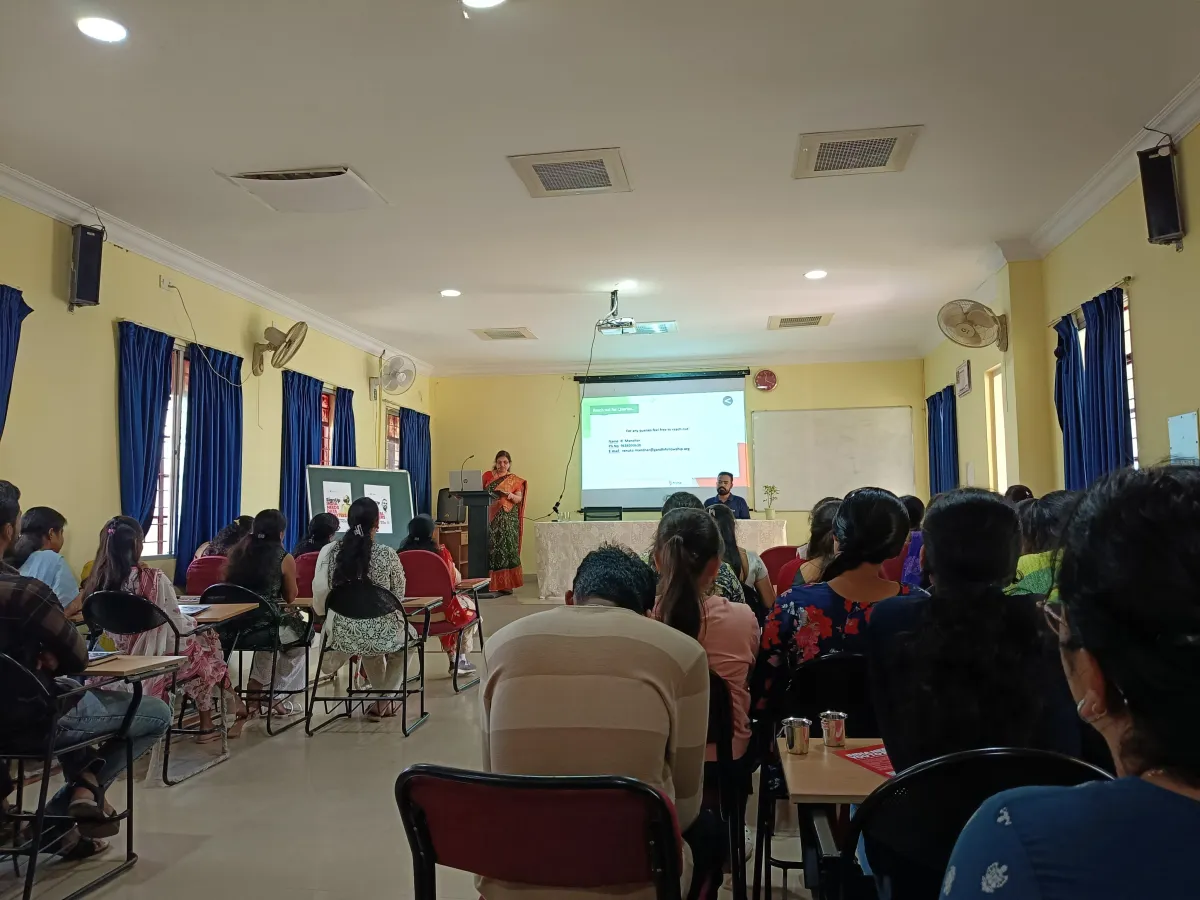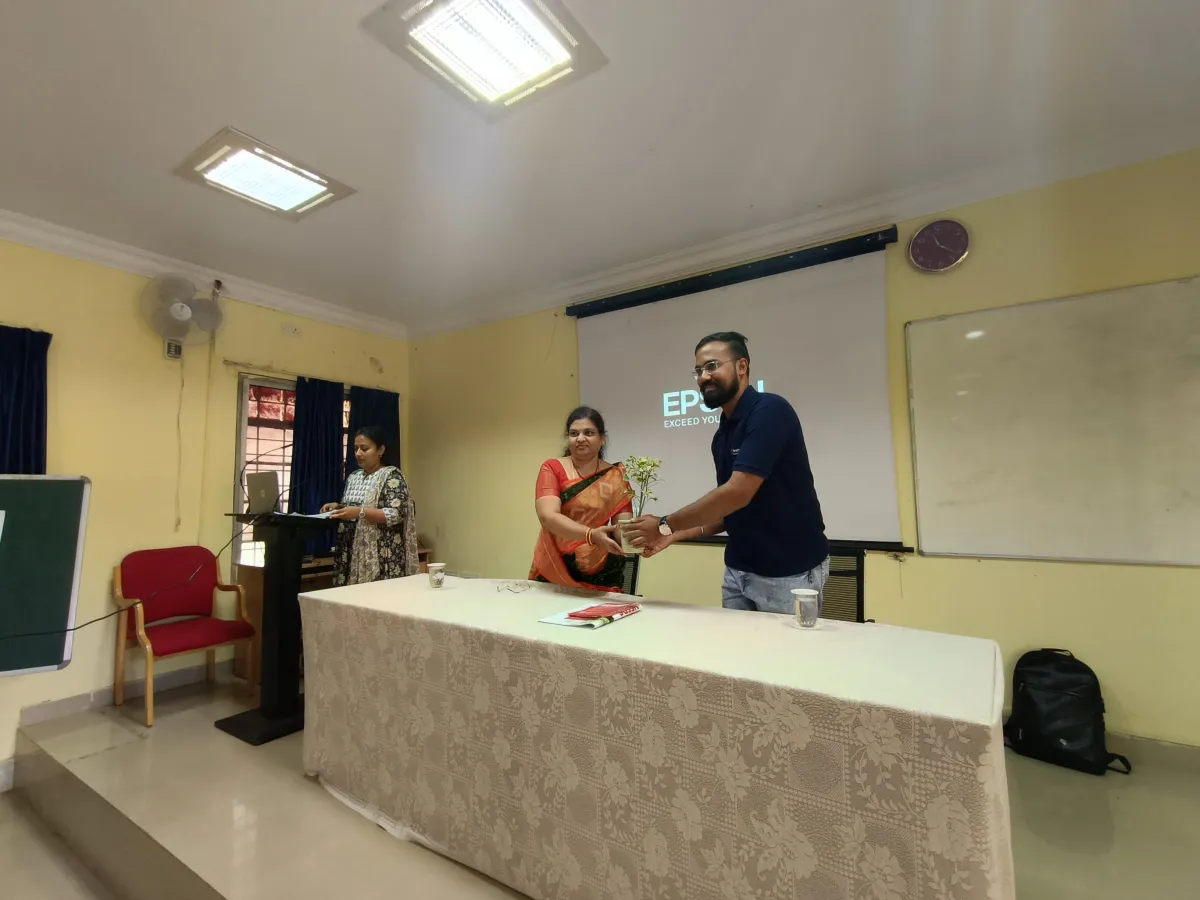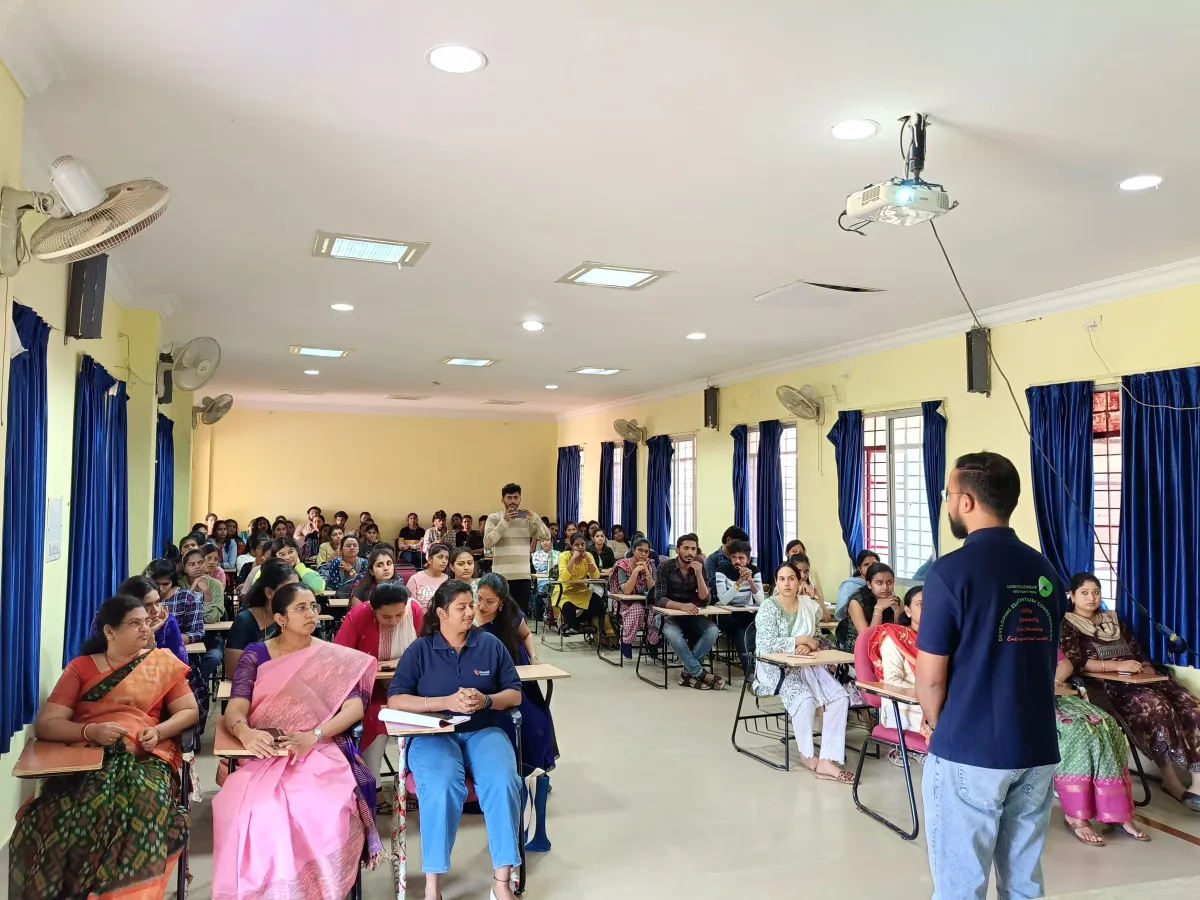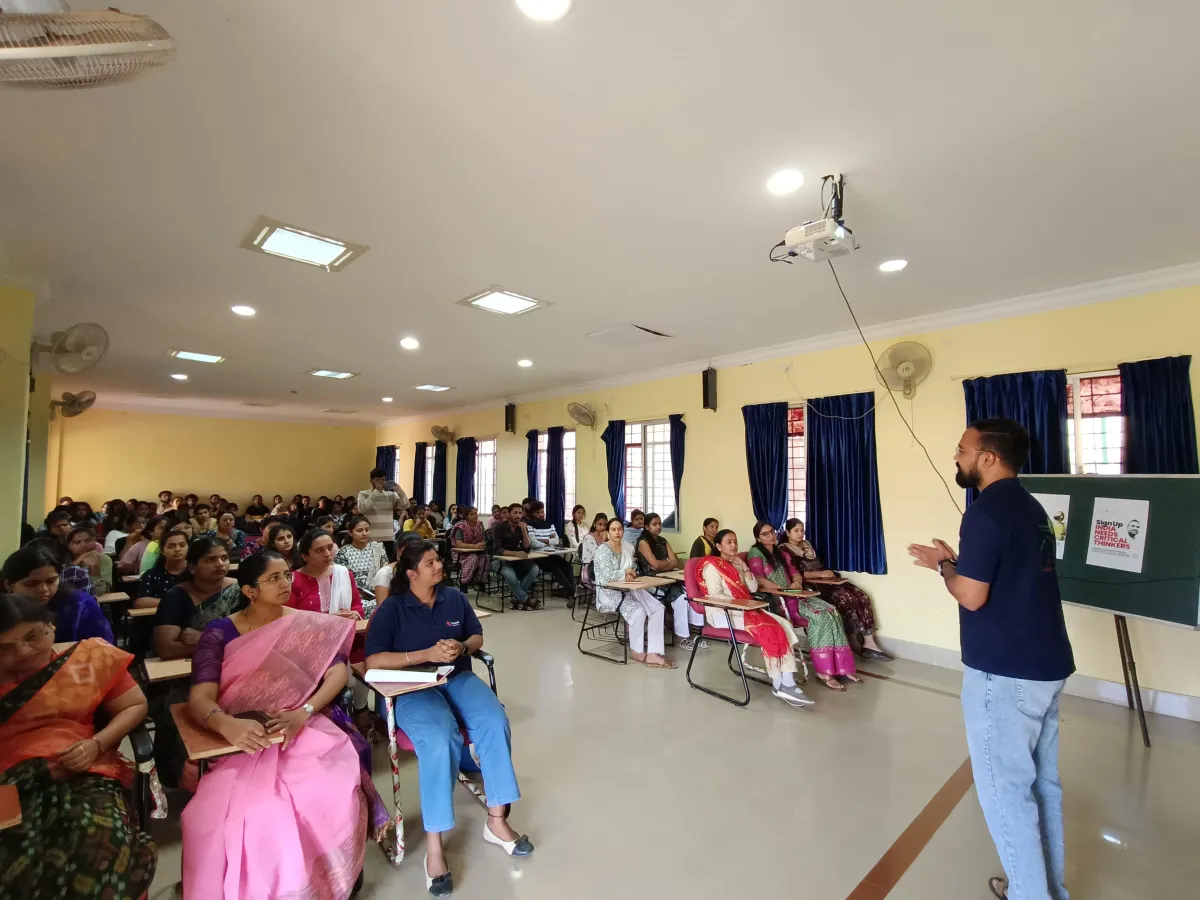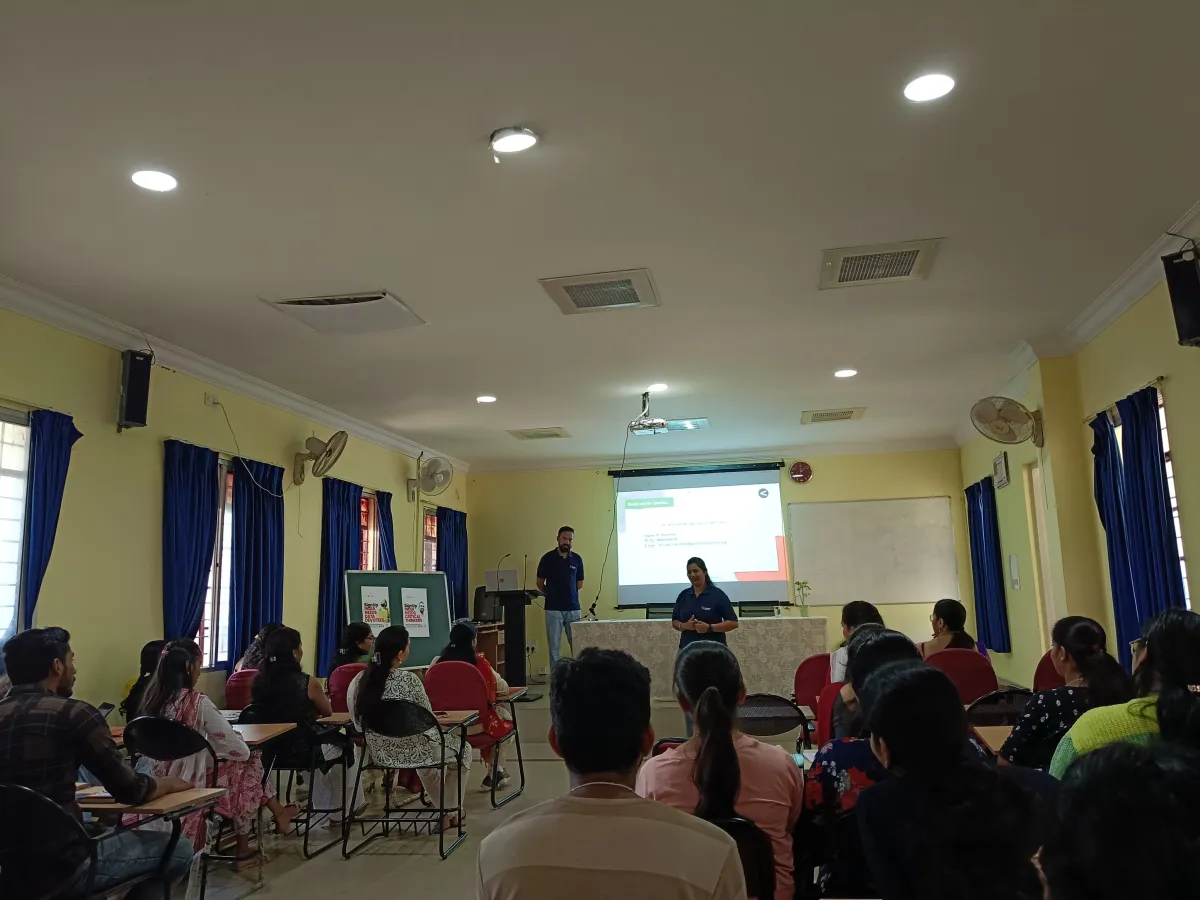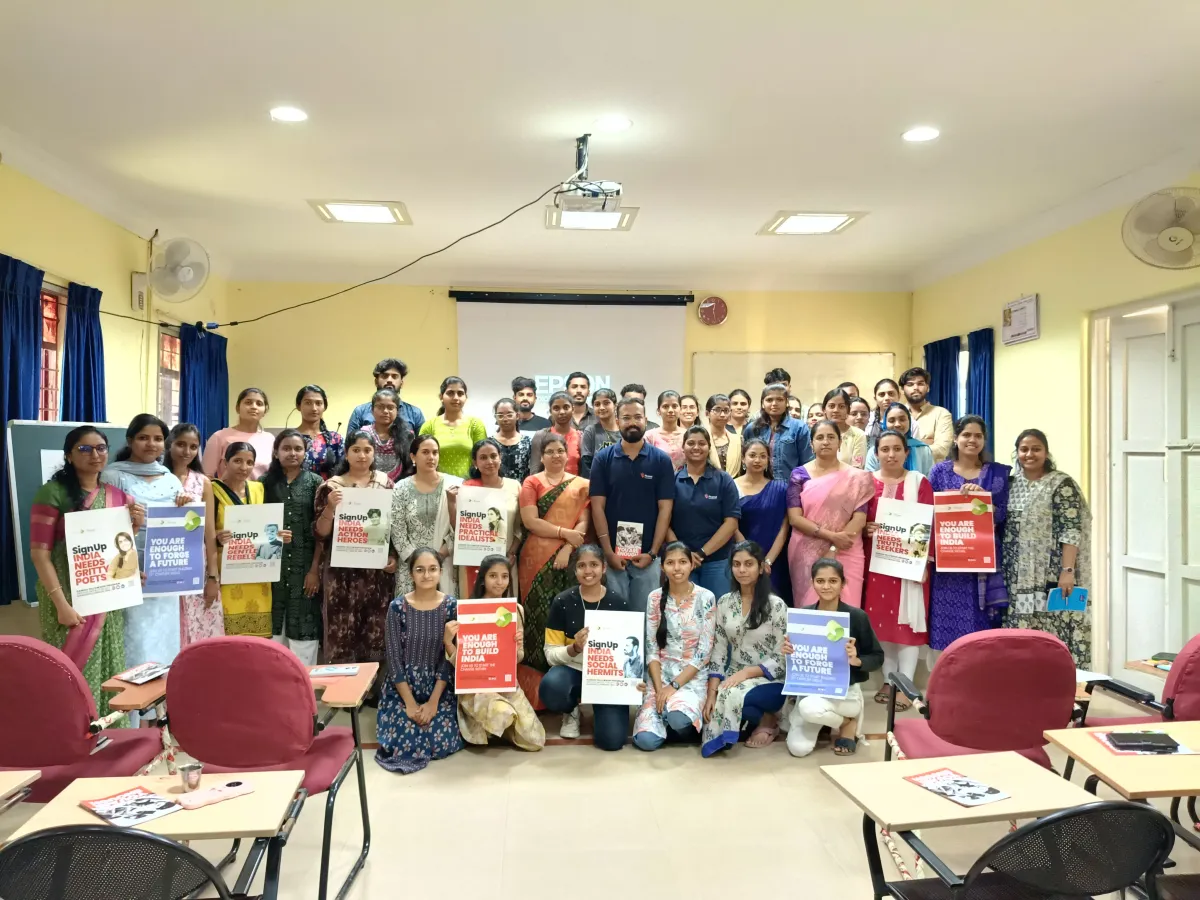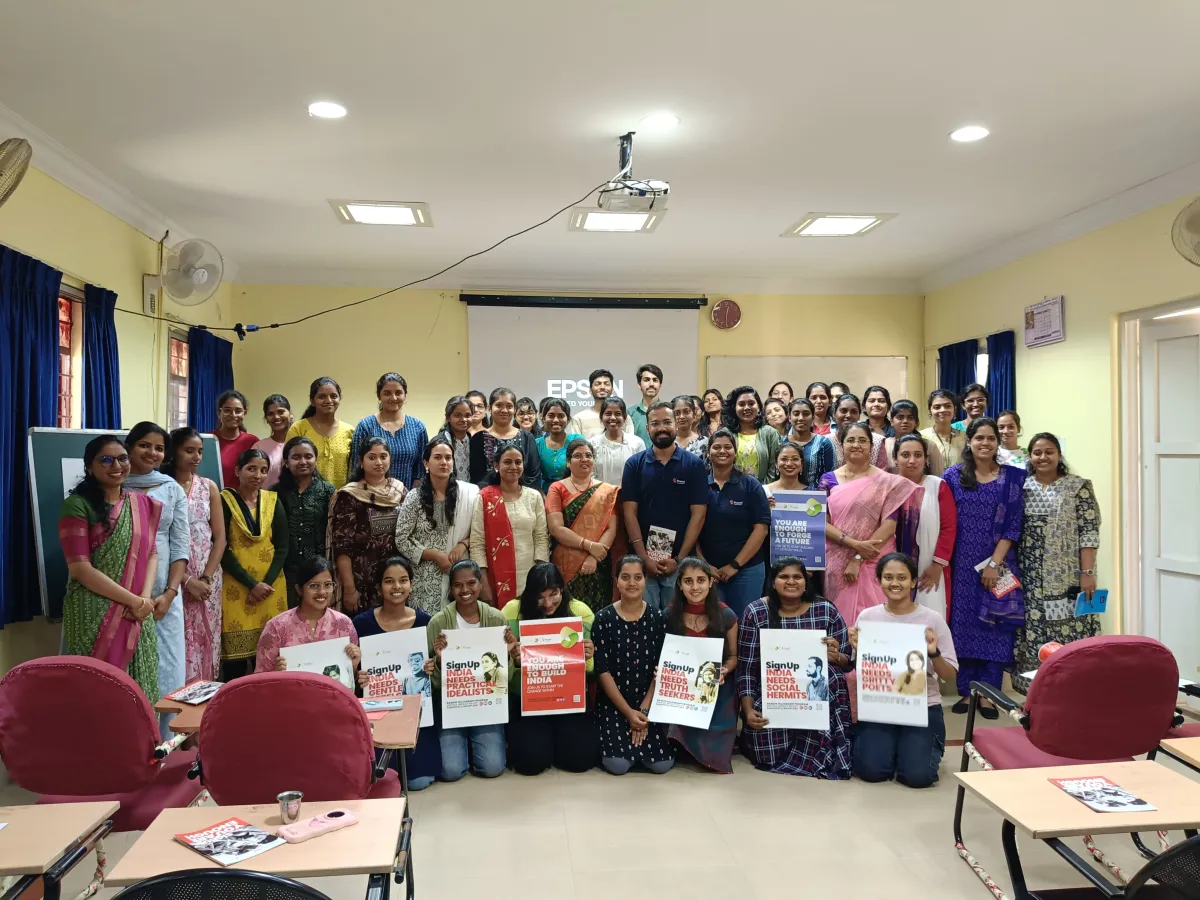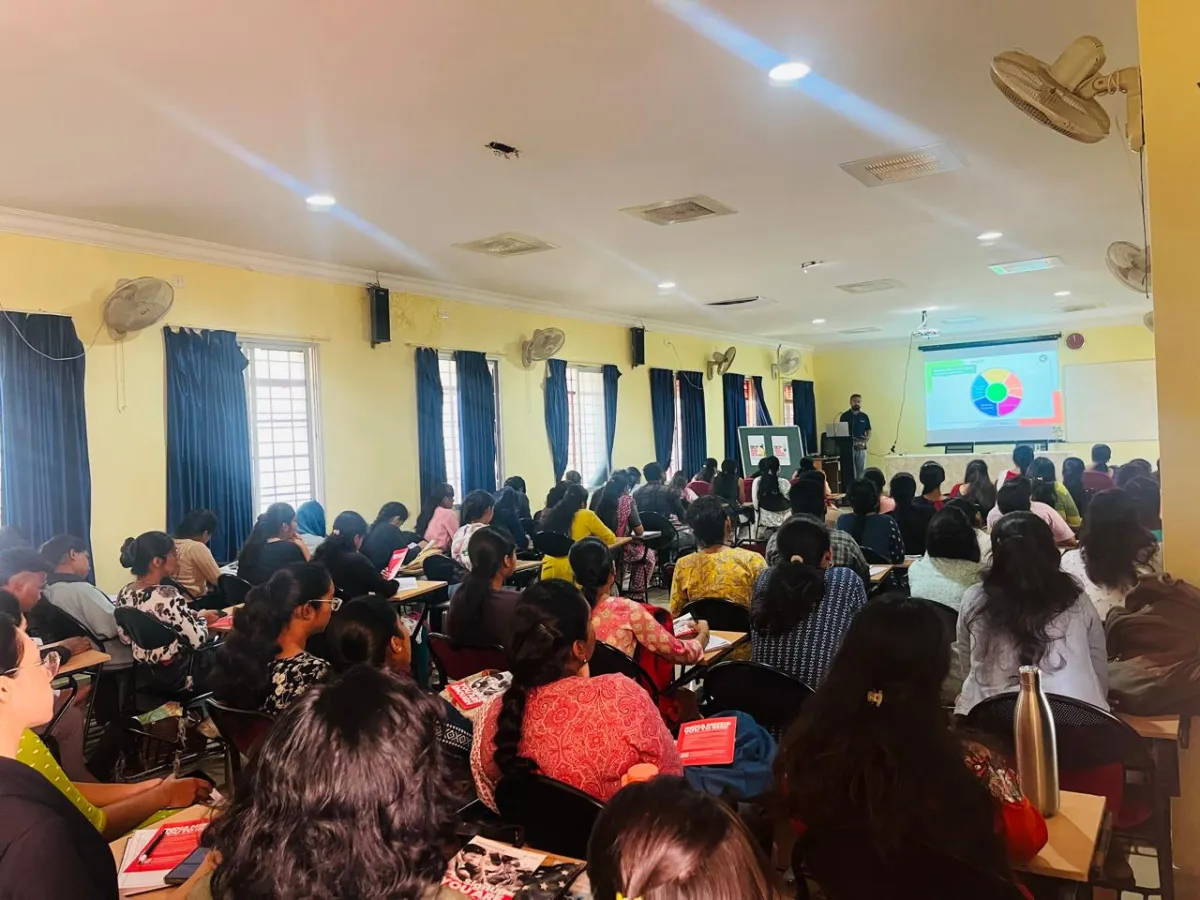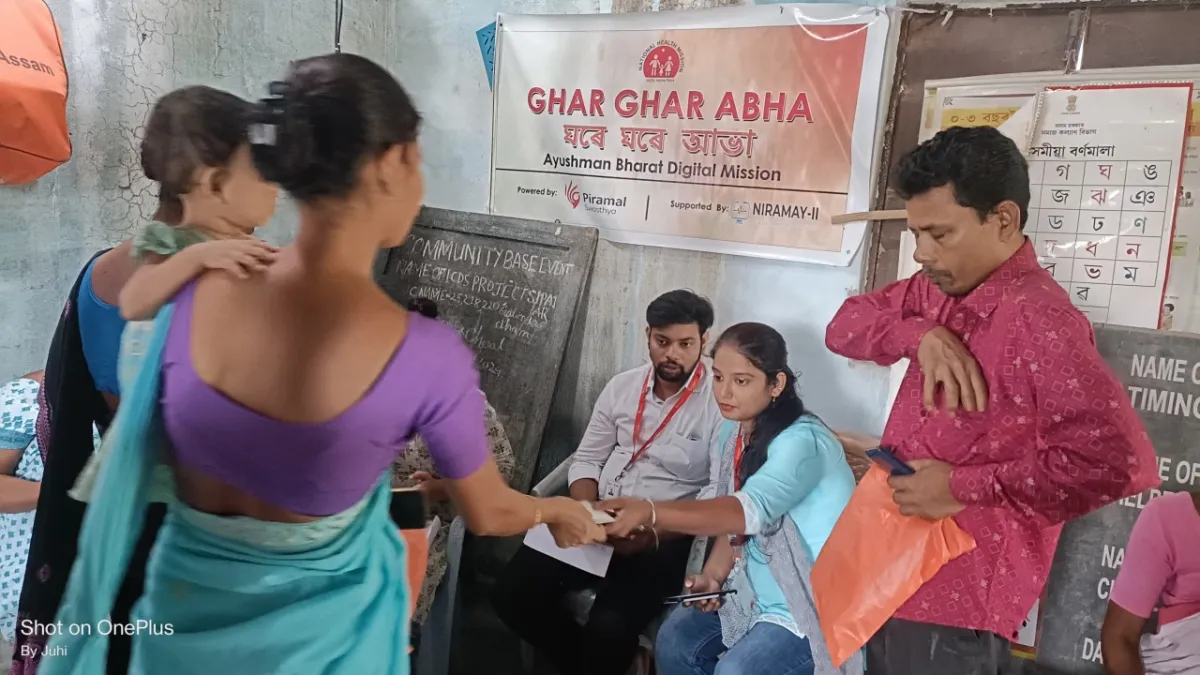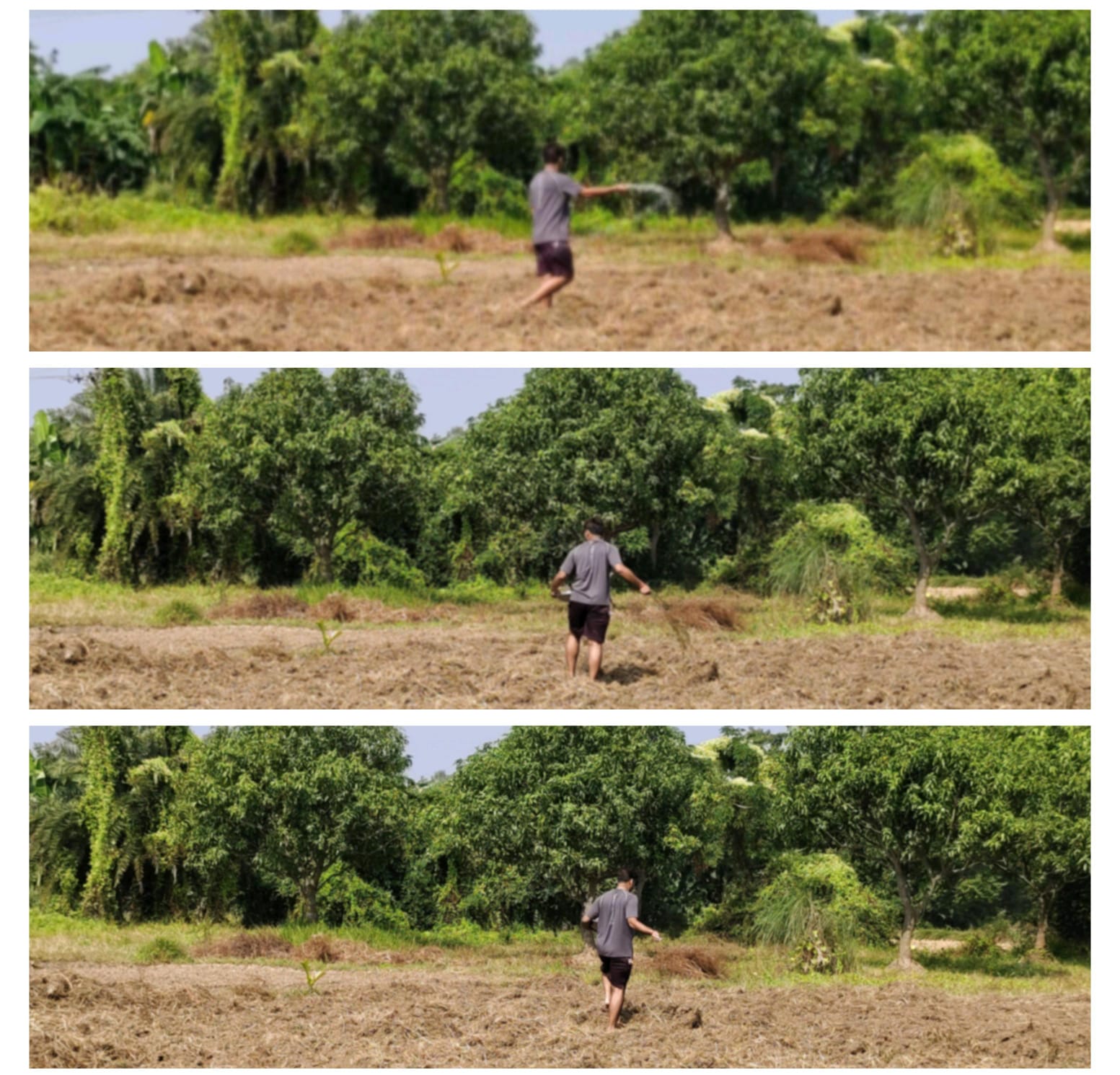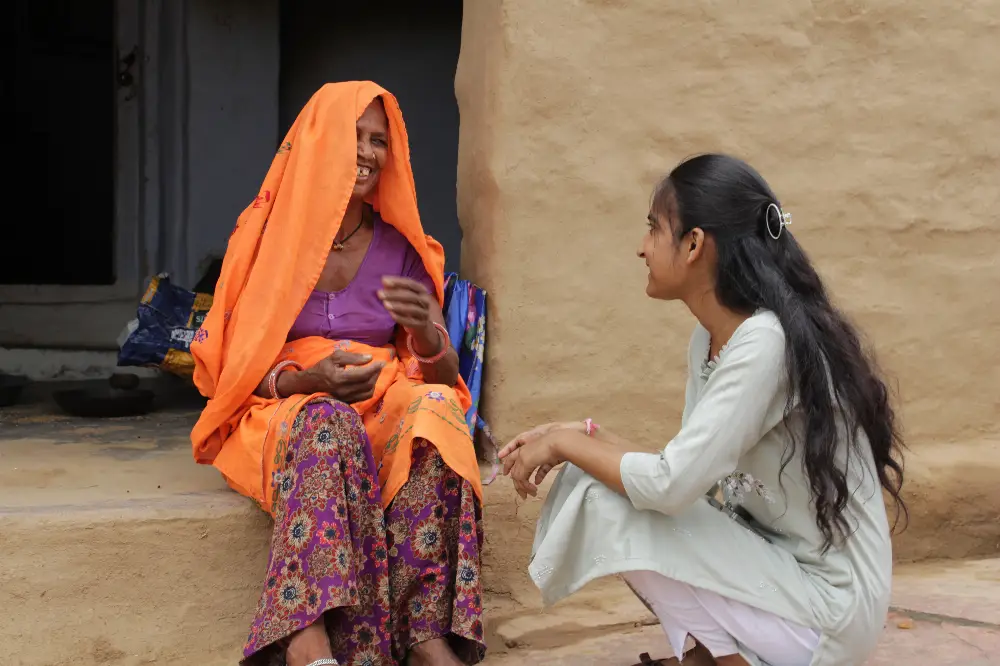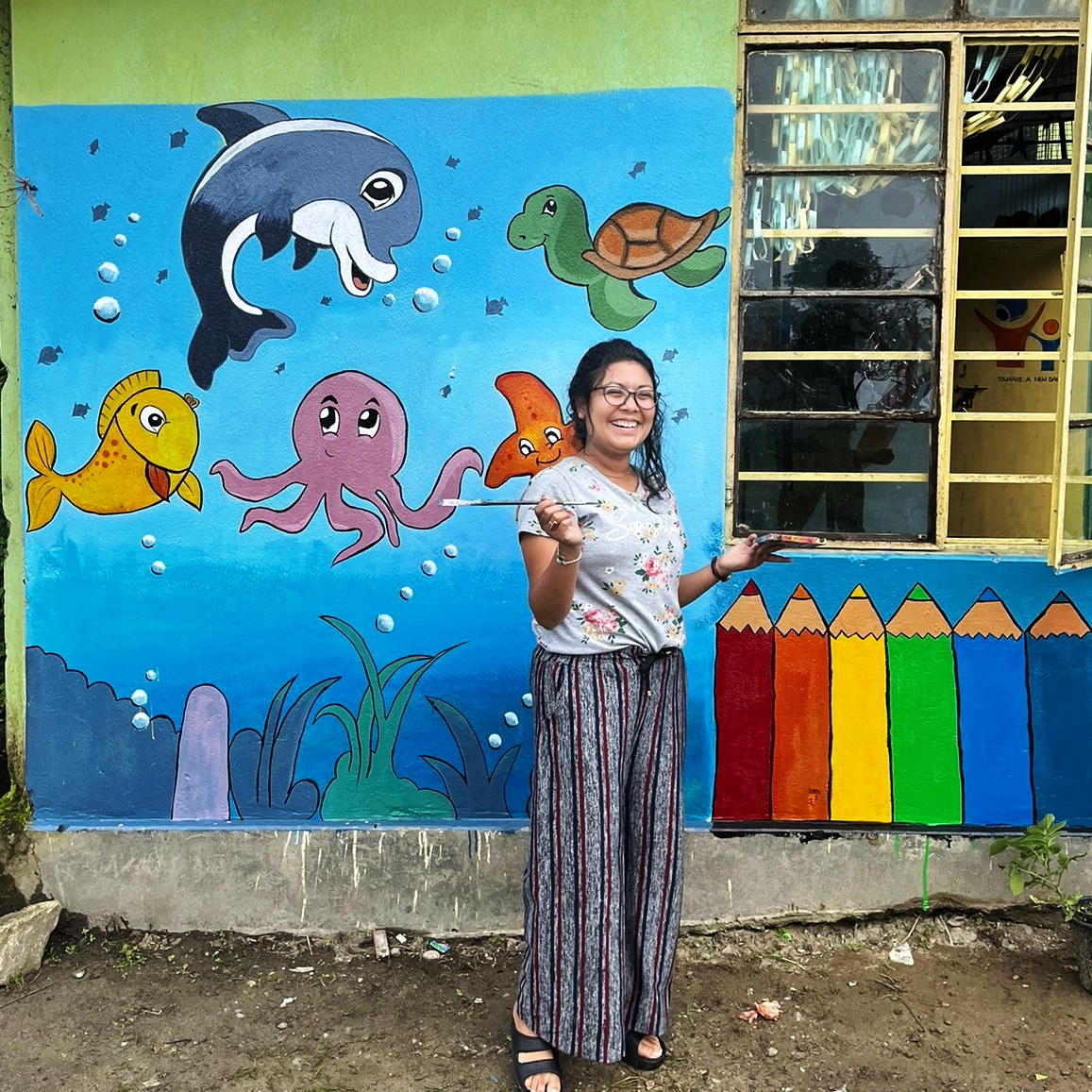Years ago, I walked into a government office for the first time, nervous yet eager to learn. Fast forward to September 2023: “Divya, you will be attending the ‘संकल्प सप्ताह’ event in New Delhi on my behalf, along with the SDM Bijapur.” These were the words I heard over a phone call from my then District Magistrate (IAS Rajendra Katara) one afternoon in September 2023. Representatives from 112 aspirational districts and 500 aspirational blocks across the country were gathering under one roof for the launch event of Sankalp Saptah to partake in discussions around the transformation and holistic development of these districts. Being someone who self-evaluates a lot, I felt the familiar wave of doubt creeping in. But this time, I stopped myself. This was not the time to question—it was the time to show up. And with that thought, I packed my bags and left for Delhi with my colleagues. The moment I walked into the massive hall of Bharat Mandapam for the first time, I was taken aback. A hall that could accommodate more than 3,000 people under one roof—standing in a place like this for the first time felt surreal. The chairs were adorned with red cloth, places designated with the names of respective states across six blocks converging downward to the central stage, and people in hundreds—some standing, greeting, and chatting. As I walked in, I happened to meet Manmohan Singh the head of the Aspirational District Collaborative Program at Piramal Foundation. That small interaction with him stirred something within me. But as the hall filled with thunderous applause upon the arrival of the Honourable Prime Minister, I was snapped back into the moment. Listening to the Prime Minister’s words—how a year ago, global leaders sat in the same hall deliberating on pressing global issues, and now, government officials and Panchayati Raj delegates from across the country were seated here to discuss their nation’s development strategy—transported me back to my early days in the development sector, to my time as a Gandhi Fellow, to the beginning of my journey as a Development Professional. I was reminded of the first time I stepped into the office of an IAS officer, completely in awe of the aura they carried. Back then, I had no idea that soon I wouldn’t just be meeting bureaucrats—I would be working alongside them. Not just executing projects but shaping discussions around fundamental issues in the district. It took me back to my first facilitation session, where I oriented 30+ district-level government officials—in the presence of the Chief Development Officer (IAS Ashish Bhatgain)—on NITI Aayog’s Aspirational District Program. At the time, it was just a presentation for me. But now I realize that in that moment, I wasn’t just facilitating—I was earning my place in that room, building credibility without even knowing it. I thought about the time when the DM (IAS Yugal Kishore Pant), Udham Singh Nagar entrusted me with creating a PowerPoint presentation for a meeting to be led by Smt. Smriti Irani, the then Minister of Women and Child Development. I worked on it for days, making multiple revisions and working late office hours. When the DM later appreciated my work, I thought I had just designed good slides and ensured accurate data. But now, I realize I didn’t just create slides—my work was leading conversations at higher levels. I thought about the Systematic Voters’ Education and Electoral Participation (SVEEP) event I proposed to the DM and then hosted for the Uttarakhand Assembly Elections 2022 at Metropolis Mall—standing in front of an audience of 250+ people, engaging them on voter awareness in the presence of the DM (IAS Yugal Kishore Pant) and CDO (IAS Ashish Bhatgain). Back then, I saw it as just another event executed successfully. But now I realize I wasn’t just managing an event—I was handling public messaging, government coordination, and stakeholder engagement all at once. And then, there was my role in managing 30+ Campus Ambassadors (NCC Cadets) for the SVEEP Program in the Uttarakhand Assembly Elections 2022. At the time, managing them meant overseeing daily activities, awareness sessions, and grievance redressal. But looking back, I realize that leading that team for over a month wasn’t just about management—it was about leadership. It was about delegation, motivation, and trust-building—skills that later helped me navigate government structures with ease. This weekend, as I was reminiscing about all these experiences while also thinking about wrapping up my stint in Bijapur soon, I felt a mix of nostalgia, happiness, and worry. Thoughts of What next? began to creep in. I found myself comparing my journey with my colleagues—people who seemed more stable, more accomplished, and more ahead. And then, in the middle of this emotional spiral, a sudden realization hit me. Over time, I had started downplaying my own efforts. I had begun to believe that these things came naturally to me—that they weren’t something I had learned over the years. That anyone in my place could have done them. But looking back, I realize—they didn’t just happen. There was immense learning and experience beneath all of it. For a 25-year-old Divya, this might not seem like a big deal. My aspirations have outgrown my past achievements. I want more. I aim higher. But if I could tell 12-year-old Divya, a girl who had just left her village to pursue higher studies in Dehradun, where she would be standing today—she wouldn’t believe it. So, looking ahead, I know one thing for sure. This all didn’t just happen. I learned it. I learned to gain trust, build credibility, navigate bureaucracy, read a room full of officials, and communicate in a way that ensured my ideas were not just heard but acted upon. And without even realizing it, I have been building this skill all along—a skill that comes with responsibility. And that, in itself, is something to be proud of. So, here’s my reminder—to myself and to you: Don’t measure your progress with someone else’s ruler. Sit back, reflect, and
From December 14, 2024, to January 5, 2025, I had the privilege of living in the village of Ramnagar in Bhilwara as part of the Community Immersion (CI) initiative. Little did I know that these 20 days would become one of the most cherished moments of my life, leaving an indelible mark on who I am today. During my time in Ramnagar, I lived with a family that welcomed me with open arms and treated me like their own. Dadi Sa, Aunti ji, Anamika ma’am, and Anurag were not just names but individuals who became my second family. Their warmth, love, and trust made me feel at home. Every shared meal and heartfelt conversation taught me the essence of humanity—one rooted in mutual respect and unconditional affection. The purpose of CI was to help us decondition ourselves from the privileges we often take for granted and immerse in the simplicity of rural life. These 20 days not only stripped away layers of entitlement but also opened a window into a dimension of my personality I hadn’t explored before—a version of me that was more grounded, responsible, and compassionate. It was a journey of unlearning, learning, and becoming. Daily Life: A Balance of Physical and Intellectual Labor Life in Ramnagar was a blend of physical and intellectual engagement. From 3:00 PM to 5:00 PM, I worked in the fields, assisting with tasks like cutting Kasmi for cattle and harvesting spinach and radishes for meals. I also helped in the cattle shed, ensuring the buffalo and its calf were well-fed with water and husk. These activities brought me closer to the land and taught me the value of hard work. On the intellectual side, I contributed to the community by teaching mathematics and science at the local girls’ school. This wasn’t just about academics—it was about fostering a connection with the students and empowering them with knowledge. Each day was an opportunity to learn from them as much as I hoped to teach. The Community Project: Building Skills Through Physical Literacy As part of my CI, I initiated a project aimed at enhancing 21st-century skills in children through physical literacy. I noticed that the children lacked structured opportunities to develop skills like teamwork, critical thinking, coordination, and communication. To address this, I organized traditional games like Kho-Kho, Kisan-Lomdi, Ganesha, Jal Thal, Pitthu, and Chain-Chain. These activities, deeply rooted in the community’s culture, were both engaging and educational. Over time, I observed a marked improvement in the children’s ability to work as a team, think critically, and coordinate effectively during gameplay. Their enthusiasm and growth reaffirmed my belief in the transformative power of community-driven initiatives. Self-Change Story: Letting Go of Biases The CI experience wasn’t just about contributing to the community; it was also about personal transformation. I learned to let go of biases and adapt to a lifestyle that was vastly different from my own. Sleeping on the floor in a small room and enduring cold nights taught me resilience, while managing both physical labor and intellectual work instilled discipline. Building trust with the children and the community required patience and creativity. Through storytelling and hands-on methods, I was able to engage the students and encourage participation. Listening to the community’s feedback allowed me to align my efforts with their needs, fostering mutual respect and understanding. The Impact: A Journey of Growth The 20 days I spent in Ramnagar were transformative in every sense. I emerged more resilient, empathetic, and self-aware. Adapting to the physical and mental challenges of rural life gave me a newfound appreciation for simplicity and connection. I learned to embrace discomfort, value meaningful relationships, and think creatively to solve problems. Most importantly, this journey strengthened my belief in the power of community. The bonds I formed, the lessons I learned, and the lives I touched will stay with me forever. Ramnagar didn’t just give me memories; it gave me a new perspective on life.
15th August 2024 marked the completion of my first month as a Gandhi Fellow in Rajasthan, and there couldn’t have been a more symbolic day than the 78th anniversary of India’s independence. This article isn’t just about my life as a Gandhi Fellow over the past month; rather, it serves as a collection of my observations while working within the school systems of two starkly contrasting districts of Rajasthan, namely Karauli and Ajmer. Karauli, a small village-town on the borders of Uttar Pradesh and Madhya Pradesh, is an underdeveloped place. The town is beautiful and filled with numerous rainfed lakes and ponds. People are cordial and not quick to judge. The long bike rides on the broken, muddy, hilly terrain of Karauli reminded me of my native place. I couldn’t help but feel saddened by the state of schools there. The schools are far from the villages and often run by a single teacher. Power cuts are regular and can last for hours. Unfortunately, this is the case in the majority of poorer districts across India. Ajmer, a city that needs no introduction, is culturally rich and well-developed, with a rapidly growing population. It bears little resemblance to Karauli, except for the people, who are just as cordial and loving as those in Karauli. Ajmer(Urban)’s schools are better in terms of infrastructure, resources, and electricity. Ajmer(Rural) is significantly behind, yet some schools there are better than the schools in Urban Ajmer, and others are catching up pretty fast. One thing prevalent in both districts that bothers me the most and hurts me to the core is the complacent attitude that has seeped deep into the mindset of government school teachers. This article neither aims to accuse nor should be taken as a yardstick to judge all school teachers; rather, it aims to point out a major drawback in our education system: the resignation to the status quo. Even in a setting with more opportunities, the drive to innovate and push boundaries seems dampened by a reliance on traditional methods and the pressures of administrative duties. The undue pressure on teachers to engage in time-consuming bureaucratic tasks, whether in school or otherwise, poses a major limitation in the execution of their duties, and one must be sympathetic to their woes. I do not question their motivations or their intentions, yet their lack of effort often impedes the learning process of students. The modern world requires teachers who can adapt to change and guide their students through an evolving educational landscape. In a world of AI, Machine Learning, and Chat GPT, it makes little sense to stick solely to the blackboard and chalk. While traditional methods like the blackboard have their place, embracing technology can enrich the learning experience, making it more relevant and engaging for today’s students. India scores low on the Human Development Index, and this issue of a complacent mindset is one of the major reasons behind it. This issue isn’t just confined to school teachers but pervades the entire public education system in India. However, I believe the major concern lies with the teachers, as they are the guiding lights for millions of underprivileged students. They are the only resource available in the rural interiors of India who have both the capability and the reach to give these underprivileged students a chance at fulfilling a higher destiny. And this is exactly what the Piramal Foundation seeks to achieve—a mindset shift. As a Gandhi Fellow, I aspire to nudge the stakeholders into taking small yet necessary steps to bring about effective and meaningful change in their teaching methods. Whenever I feel small and vulnerable in front of all these challenges, and when I don’t see change despite persistent effort, I seek refuge in the words of Mahatma Gandhi. He once said, “In a gentle way, you can shake the world.” One does not need to be an authoritative figure or a Messiah to bring about change in society; all one needs is persistence and empathy. I believe I have both.
Introduction In keeping with their annual tradition, Christ University (Bengaluru) had organized the annual career fair “DAKSH,” a two-day mega event to highlight the best opportunities available at Christ University and their partner agencies in recruitment and institutional liaison. Gandhi Fellowship, under the aegis of Piramal Foundation, has a long-standing relationship with this esteemed institution for 8+ years, with several Gandhi Fellows recruited from amongst the various campuses of Christ University. It was an honor to participate and be a part of the two eventful days during DAKSH-2025 networking with similar minded groups and individuals, paving the way for our future growth. Highlights of Daksh: The Stall The presence of Gandhi Fellowship Program (GFP) was established through the setting up of a stall with colorful creatives and eye-catching posters that form the core of our program. It was a clarion call for all our visitors as to how the Fellowship program focuses on enhancing 21st century skills and what are the set of exciting processes that make it unique. A complete view of our stall during the event Alumni testimonies, visual representation of the Fellowship through the story of Sagar and Jaz, focus on post fellowship opportunities, a KYC game to break ice through the posters for Batch-18 and an outline of the recruitment process were the key attractions at our stall. The stall was constantly surrounded with buzz Networking With close to 80 stalls and an estimated footfall of 175+ people over the two days, our stall was abuzz with activity for the two days. It was exciting and exhaustive interaction with the faculty, students and parents about their clarifications and curiosity regarding the Fellowship. Nevertheless, it was fulfilling and rewarding to experience this footfall. With Anamika Deb, from the Big Bet DBC who had joined us at the stall During the visit to stalls of NCC and Peer Education System A good amount of time was spent visiting other stalls; notable among them being the National Cadet Corps (NCC), Peer Education System, Center for Social Action (CSA) to interact with them; sharing with them about the Fellowship, its USP and how it would help the students in having a long-term career. Interaction with Para Commando Forces A high moment during the event was the interaction with Major Ajay Singh accompanied by his colleague who dropped by to visit our stall, knowing more about the organization and our body of work. He was extremely happy to know more about this unique Fellowship and left us with a Food for thought too. A query he raised was, “Could Agni-veers join this Fellowship, after their 4-year service period; but the minimum graduation requirement will be a hindrance”. He asked to see if this could be a possibility in the future. Interaction with Major Ajay Singh who also shared his written feedback Special Mention and Gratitude The event could not have been possible without the support and creative visualization of Ms. Deekshitha, who worked with me from the conceptualization of the stall to the long-standing interactions with various stakeholders during both the days. We look forward to collaborating with more like-minded individuals like her who wish to join us to foster the culture of 21st century skills and excellence among the students of various universities. Ms. Deekshitha, during the event A fun moment during the event We would like to convey our gratitude to the University Student Council, Centre for Placement and Career Guidance for their full support in allowing our active participation during Daksh and we look forward to furthering our long-standing relationship with the esteemed Christ University.
(In collaboration with Gandhi Fellowship and Department of Food Science and Nutrition, HumanDevelopment and Family Studies, University of Mysore) Today the world is at the cusp of transformation and hence, there is a constant need for upkeep to stay abreast of the metamorphosis surrounding us. This calls for the development of certain skill sets and competencies that support us over and above what the academic degrees offer us. In view of this, a workshop was organized with the final year students of the Department of Food Science and Nutrition, Department of Human Development and Family Studies at the seminar hall of University of Mysore. Details of the EventThe session began with the keynote address by Dr. Komala M, Chairperson and Head, Department of Food Science and Nutrition who set the context for the session in terms of value addition the students could have through this brief workshop and interaction. She also stressed the need to stay relevant in today’s world by constantly updating ourselves on the changes around us. The need for collaboration between universities and organizations is more than necessary today to guide the students onto becoming assets for the nation and focus on their holistic development. Dr. Prabhavathi, Professor, Department of Food Science and Nutrition; also graced the occasion and spoke to the students on the importance of multi-faceted and domain agnostic opportunities like the Gandhi Fellowship which gives students a peek into the administration and running of the nation, along with a host of other skill sets developed by working on ground. There was a formal release of the posters of the 18th batch of the Gandhi Fellowship by the faculty of both the departments followed by circulating it among the students, who were intrigued by the uniqueness of the posters. This was followed by an interesting icebreaker activity rejuvenating the group of youngsters who participated in it enthusiastically. The first segment focused on defining Change for the students. Many daily life-based interactive questions were designed to ensure more active student participation. There was an incredibly positive response from the students, who actively shared their interests and choices finally culminating in our key pointer “What is Change and How do you define it.” With this key metric defined, we went ahead with our next segment establishing the change across various sectors in terms of Jobs. We also made sure that the students work individually on identifying jobs available in their respective sectors today, the ones that could be in high demand over the next few years and the ones that could become obsolete by the end of the next decade. This exercise brought the importance of the role of technology, Artificial Intelligence, Data analytics in bringing a change in basic assumptions in jobs and what the new age jobs look like and the kind of pivot that today’s students need to undergo to adapt themselves. This scenario helped the students to understand the nature of future jobs and the kind of skills they need to equip themselves with to have a long and fulfilling career ahead. What surprised me was that the students themselves arrived at these skill sets after collective reflection and brainstorming in their individual focus groups. At the end of the activities, Deekshitha. S (Alumni of Department of Food Science and Nutrition and the wife of Gandhi Fellow R. Manohar) shared a few highlights of the Fellowship and how it holds relevance across all domains and sectors. After this, there was a brief sharing of the nuances of the Gandhi Fellowship program; why is it important for today’s youth and what are the factors that make it relevant for them much more than ever before? There were few incisive questions raised by the students at this point, proving their thoughtfulness and interest in such kind of programs. This was laced with interesting, funny and some odd anecdotes from the Fellowship Journey (Kheda, Gujarat) of Manohar. The session was concluded by summarizing Gandhi Fellowship as not just the story of one Manohar (also a batch-11 Fellow), but a sum of thousands of equally talented and supremely dedicated individuals who have now gone on to become high impact individuals across various sectors. The vote of thanks was proposed by Ms. Srujana, Faculty, Department of Food Science and Nutrition who urged all the participants to think actively about the questions raised and the change mechanism we all spoke about for the previous hour. Way Forward We look forward to establishing a long-term relationship with the esteemed institution University of Mysore and hence, would work very closely on providing the students with all the information and guidance needed to proceed with their applications and candidature for the eighteenth batch of the Gandhi Fellowship Program. Also, we would like to partner with the University on various other programs and workshops and would like to build a strong coherence with them on the shoulders of NSS-led partnerships and like-minded collaboration
“Progress is impossible without change; and those who cannot change their minds, cannot change anything.” – George Bernard Shaw In a world defined by rapid innovation and constant evolution, the role of young people in driving and managing change has never been more pivotal. Today’s youth, with their fresh outlooks, technological expertise, and natural adaptability, are stepping into roles that require bold leadership and innovative problem-solving. Unlike earlier generations, they operate in a landscape where change is the norm, and their ability to think creatively is reshaping conventional approaches to managing change. By examining the impact of youth in change management, we discover how their unique traits—such as flexibility, teamwork, and foresight—are fostering a new era where innovation and adaptability are not only valued but essential. Youth Leading the Charge in Change Management Insights into change management are deeply influenced by real-world success stories, such as the impactful work of young Gandhi Fellows. These stories highlight a theory of change centered on addressing complex issues with resourceful solutions, grounded in collaboration, systems thinking, and profound empathy. Many of these young changemakers have left a lasting impression on how challenges are approached today. Revolutionizing Rural Healthcare | Rahul’s Story of Digital Transformation In a remote village in India’s heartland, Afsana Begum, an ASHA (Accredited Social Health Activist) worker, starts her day visiting households, advising expectant mothers, and educating families about healthcare. However, her work has transformed—instead of lugging around bundles of registers and notebooks, she now carries a tablet equipped with the Utprerona application, a tool designed to revolutionize rural healthcare services. This shift was enabled by Rahul, a young Gandhi Fellow, who spearheaded the Digitalized ASHA program under the Digital Bharat Collaborative initiative. A Pivotal Moment of Change During one of her visits, Afsana encountered a high-risk pregnancy case. Using the Utprerona app, she accessed the patient’s medical history, logged symptoms, and flagged the case for immediate attention. The app’s real-time functionality alerted doctors, ensuring the patient was referred to a hospital within hours. This timely intervention not only saved lives but also strengthened trust in healthcare services. Transforming Rural Healthcare in Assam | Juhi’s Fight Against Tuberculosis In a small village in Assam’s Sipajhar Block, Sunita Devi, a 28-year-old mother of two, suffered from a persistent cough and fever for weeks. Like many in her community, she hesitated to seek medical help due to stigma and a lack of awareness, worsening her condition. Juhi, another Gandhi Fellow working under the Digital Bharat Collaborative (DBC) initiative, played a crucial role in tackling such challenges. Juhi trained ASHA worker Nalini Devi to use the Nikshay application, a digital tool for managing tuberculosis (TB) cases. During a door-to-door health survey, Nalini, empowered by Juhi’s training, identified Sunita as a suspected TB patient. Lessons from Rahul & Juhi: Driving Impact Through Digitization The resilience and determination displayed by young people often go unrecognized. Rahul and Juhi’s efforts exemplify the power of building strong relationships to leverage technology and drive innovation. Their success in leading change through digitization highlights several key attributes: By embodying these qualities, Rahul and Juhi have shown how young leaders can effectively implement grassroots change through digital solutions. This approach is becoming a defining feature of modern change management. By uniting diverse stakeholders, championing digital innovation, and fostering collective responsibility, they aim to build a sustainable framework for addressing healthcare challenges across the country. The Youth’s Role in Shaping the Future As India remains the youngest nation in the world, the involvement of youth in leading change initiatives and having a voice in decision-making is more vital than ever. Paired with the transformative power of technology, young changemakers are uniquely positioned to tackle and simplify some of the most complex global problems. Story Credits Juhi & Rahul, Gandhi Fellows, Batch 16, Assam
The sun rose gently on my 10th day of community immersion. As usual, I woke up, freshened up, and set out to explore the nearby areas. The market was lively, and as I walked through, a man approached me, curious about my presence. “Why have you come here?” he asked, his tone a mix of curiosity and doubt. I smiled and explained the purpose of my community immersion, sharing how I was here to learn and connect with the local people. His questions continued. “Where are you eating your food?” I told him about the kind families who had been sharing their meals with me. Then came a question I hadn’t expected. “What is your caste?” “I am a Brahmin,” I replied honestly. His expression shifted, and he said, “Then why are you eating in those houses? They are low-caste people.” I paused for a moment before replying calmly, “Food has no caste. It is sacred—a blessing. When people offer food with love, that is what matters most.” He seemed taken aback, perhaps reevaluating his own beliefs. After the market visit, I returned to my temporary home, ate a quick meal, and then headed out to join some laborers at work. When I offered to help, they hesitated at first, unsure why someone like me would want to work alongside them. But I reassured them, saying, “There is no high or low work. All work has dignity.” To break the ice, I joked about asking for payment, which lightened the mood. We soon got to work, and I spent the day spreading fertilizer in the fields. The work was physically demanding, but it felt good to contribute and bond with them. I gave one of them my phone to capture some photos, but they ended up being blurry and unfocused. When I pointed it out, he laughed and said, “I don’t know how to take photos.” I seized the opportunity to teach him how to capture better pictures. At the end of the work, the landowner approached me and asked, “How much should I pay you?” Laughing, I said, “It’s up to you.” To my surprise, he handed me ₹50. As I held the money in my hand, a wave of realization hit me. That small amount wasn’t just money—it symbolized the value of hard work. It made me think about how easily we spend money on material things without truly appreciating its worth. I realized that true happiness doesn’t come from extravagant possessions but from valuing the simple, meaningful moments in life. Reflecting on my journey, I thought back to when I first applied for the Gandhi Fellowship. I had been excited about the possibility of being placed in a beautiful, mountainous region like Kashmir or Uttarakhand. When I found out I was assigned to Bihar, I felt disappointed, especially since one of my friends got placed in Assam. But over time, I’ve come to see this as an unexpected adventure. Bihar has challenged me in ways I never anticipated, teaching me lessons I couldn’t have learned elsewhere. Life doesn’t always go as planned, but I’ve realized that the unplanned paths often lead to the most meaningful experiences. As I rested that evening, I couldn’t help but smile, grateful for the day’s lessons and the journey ahead. I’m learning to embrace the unexpected, break barriers, and find joy in the simplest of moments.
“Success is not final; failure is not fatal: it is the courage to continue that counts.” – Winston S. Churchill Madhavi, a 22-year-old young woman working in rural Bihar, was struck by a life-altering personal tragedy just one month into her Gandhi Fellowship. Her father passed away, leaving her emotionally devastated and questioning whether she could continue her work. At the same time, the Primary Health Centre (PHC) she was working at was grappling with significant challenges: high Maternal Mortality Rates (MMR) and low morale among the ASHA workers. Balancing personal grief with the intense responsibilities of her fellowship tested Madhavi’s resilience in unimaginable ways. But rather than succumbing to her pain, she found the strength to keep going, ultimately turning her grief into a driving force for meaningful change. In doing so, she not only transformed herself but also had a profound impact on the community she served. Madhavi’s story is a compelling reminder of the power of resilience—how adversity can be a catalyst for personal growth and how, when nurtured, resilience can ignite social change. At Piramal Foundation, we have witnessed many such stories of young individuals, like Madhavi, who have demonstrated the transformative power of resilience. After 15 years of working with young leaders through the Gandhi Fellowship Program, I’ve come to see resilience as not just a skill but a mindset—a mindset that empowers young people to overcome life’s toughest challenges and lead with courage and conviction. Resilience in Action: The Turning Point for Madhavi Madhavi’s story is not unique, but it is emblematic of the struggles many young people face today. Whether dealing with personal loss, professional pressure, or systemic issues, today’s youth are often confronted with adversity. What sets individuals like Madhavi apart is their ability to face these challenges with resilience—a trait that is increasingly vital in our fast-changing world. From global pandemics to economic uncertainty, resilience has become a non-negotiable trait for navigating today’s complexities. Madhavi’s ability to turn her grief into a force for good illustrates the importance of perseverance, emotional strength, and the willingness to keep moving forward despite overwhelming odds. This speaks to one of the core principles of the Gandhi Fellowship: how do we help young people build the mental toughness that allows them to persist, adapt, and grow, even in the face of adversity? Resilience as a Core Competency in Leadership For Madhavi and many other Gandhi Fellows, resilience has become a core part of their identity—a skill that shapes how they approach challenges, solve problems, and inspire others. Resilience is no longer just a response to hardship; it is a mindset that empowers individuals to, Empower themselves by taking ownership of their circumstances. Overcome obstacles that might otherwise derail their progress. Thrive despite setbacks, emerging stronger and more capable. Gandhi Fellows often find themselves in high-pressure situations, dealing with complex social issues, volatile stakeholders, and constantly changing policies. In these environments, resilience becomes their anchor, allowing them to stay grounded, optimistic, and focused on their long-term goals. Structured debriefs, reflective dialogues, and mentoring play a critical role in helping Fellows build this resilience, offering them the support and space to process their experiences and learn from them. Resilience in Change Management: How Madhavi Transformed Her Challenges At Piramal Foundation, one of the key areas we focus on is change management—the ability to navigate the turbulence that inevitably comes with change. While change can be overwhelming, it is also an opportunity for growth. The challenge, however, lies in preparing, supporting, and empowering individuals to manage change effectively so that they can emerge stronger on the other side. Madhavi’s story is a perfect example of how resilience can turn a personal crisis into a catalyst for social change. Faced with the unimaginable loss of her father, she had two choices: Succumb to her grief, allowing it to rob her of her sense of purpose and drive. Harness her grief, using it as a source of strength to create something meaningful and impactful. She chose the latter, demonstrating a range of behaviors that would ultimately lead to profound success for her and her community: Adaptability: Madhavi was able to adjust to life without her father, learning to cope with new circumstances and embracing new ways of working, including seeking mentorship and guidance. Emotional Strength: She displayed remarkable emotional resilience, managing her grief while maintaining a positive outlook and staying focused on her goals. Problem-solving and Flexibility: Madhavi found creative solutions to challenges, such as using her grief to fuel counseling sessions for pregnant women and mothers, helping them process their own struggles. Support Systems: She built a strong network of support with her peers, ASHA workers, and mentors, creating a culture of mutual encouragement and shared growth. Long-term Focus: Despite her personal loss, Madhavi kept her focus on her long-term goal—reducing the Maternal Mortality Rate at the PHC—rather than allowing temporary setbacks to overwhelm her. Thanks to Madhavi’s ability to harness her resilience, we now have a clearer understanding of how resilience functions in the context of change management. It is about creating an environment where people and teams can face inevitable challenges head-on, with the determination and confidence needed to keep moving forward.
Explore Gandhi Fellow Sakshi Jajal’s transformative journey with the Fellowship. Sakshi shares how “learning by doing” was key to her success, highlighting her impactful Library Initiative and Teacher Training Program. Discover her standout moment during Makar Sankranti—a life-changing experience that reshaped her views on safety and community. WATCH NOW to see how Sakshi turned challenges into impactful opportunities!
Join our journey by following us on social media
Website – https://gandhifellowship.org/
Facebook: https://www.facebook.com/gandhifellow…
Twitter: https://twitter.com/thegfprogram
Linkedin: https://bit.ly/2RgclBP
Instagram: https://www.instagram.com/gandhifellowship/
Started in 2008, the Gandhi Fellowship is a 23-month immersive leadership program that empowers young individuals to build themselves and drive societal change through experiential learning. Fellows work on real-world problems, developing innovative solutions from the ground up. With 2000+ alumni excelling in fields like media, government, development, and social entrepreneurship, the fellowship creates changemakers across diverse sectors.
#Gandhifellowship #Changemaker #Alumnistories #Fellowship
Some of us grew up with dreams. Others had dreams growing on them. Each dream is precious. Once set free, a dream has endless potential to transform those it touches. However, the Indian education system is seldom dreamer friendly. For those who seek linearity, corporate jobs, condominiums and bonuses, it seems, perhaps, promising. But what about those who dream differently? The Gandhi Fellowship was set up as a sanctuary for dreamers. Although the Fellows will vouch, a snug sanctuary is not what it feels on a given day. More than a faraway, cosy resting place, the Fellowship is an intense, emotional joyride through grassroots reality and the surprising hinterland of one’s own mind. The tagline whispers at “Work for India; Do it for you.” Not for Mama, not for Love, but for your own Self. The question all Gandhi Fellows religiously engage with is one of transformation – and that is what we require around us today. And that requires some gumption. Gandhi Fellowship Founder-Director Vivek Sharma, speaks of his current occupation as one of betting on young people as he goes campus hopping, looking for tomorrow’s leaders from among the youth. “Popular perception is that youth don’t care. But from the cream of the crop institutions to far-flung colleges, I come across a bunch of creative, non-violent constructivists waiting to take up extraordinary agendas.” “I often ask if they dream of one big issue to solve. Some answers come rapidly, mostly from the over-exposed metropolitan bacchas. Those from rural and semi-urban parts silently nod, without even the hint of a dream as if the education system clipped their wings. But I see a hunger in the belly; innocent, unpolluted minds and most important, given coaching and mentoring, they will deliver the rigour and passion required to succeed.” Understanding the precise art of transformation – idea to action, fear to courage, cynicism to change, dreamer to leader – is what the Fellowship believes will create a different world. Aditya Natraj CEO, Piramal Foundation, says, “People like Mahatma Gandhi, Verghese Kurien MS Swaminathan and Ela Bhatt felt a deep understanding of the problems they addressed. To seed the next generation of leaders, it is crucial to understand today’s scenario. As a first step, it requires exposing and familiarising them with the challenges in the Indian backyard.” Besides the exposure, the Fellowship works at giving the dreamers significant practical life experience, and opportunities to hone leadership. It is designed to develop leaders who will contribute in the domains of social entrepreneurship, civil society, politics, economy, academia and communication. Being the change you wish to see in the world, is the grain of Gandhian philosophy that Fellows live by. Change yourself first, GFs are warned before they set foot outside. The Fellowship once evolved alongside a parallel visionary idea – the Principal Leadership Development Program. The program was about lending to Headmasters, who wish to bring change in their schools, the necessary support to create sustainable change. School support involved academic and institutional transformation in which the Fellows were an executive assistant, coach, friend and sometimes, even a jiminy cricket of sorts for the older school Headmasters. Together, they created and implemented strategies to bring changes in the school fabric, measuring change, attendance, scowls, smiles, and everything in between. Today Fellows work in areas so diverse as water, health and education – with gram panchayats, block & district officials and the rural communities in the bottom districts of India. Transformation takes place not in rhetorical word play or in borrowed answers but in places that have been institutionally ignored – our lives, hearts and minds. Once the Fellows succeed in thawing the old ice, the elders at the helm of social change in India, the district and Block leadership, becomes playful like children, it doesn’t stop there. Even their spouses feel the tender strokes. Life changes once people begin to feel free and unencumbered (bhaya-mukt). Gandhi Fellows engage with divergent experiences, to gain multi-layered perspectives and to learn together, from a bustling month long community immersions, to taking a vow of silence at a Vipassana retreat and hanging out with organisations with contrasting ideologies. The Fellowship is not about making the best out of the best, explains Vivek.” While we go to top campuses, the majority of dreamers are from the districts India. “Impaired by an education system that has failed to deliver them vocabulary and grammar, what does a young person do? Yet I see a yearning across campuses, a desire to make a difference to the self and to the world around, tomorrow if not today, faltering if not coherent,” adds Vivek. The Fellowship pushes its dreamers to stretch their limits and grow in fearlessness. To understand what you must do to spur someone else’s transformation, you must be steeped in and deeply engaged with your own. And to approach the world, not as an external agent of change – but a participant means living with grassroots empathy and self awareness. It means living with integrity – and being the change you really wish to see.




